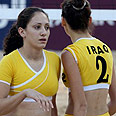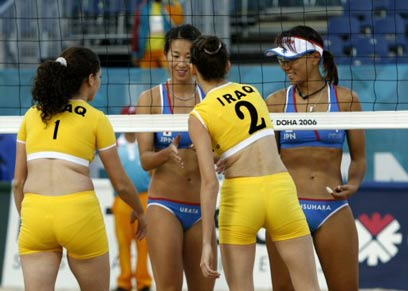
Iraqi team
צילום: איי פי
In Doha, beach volleyball bikinis create cultural clash
They didn’t wear bikini’s or win the opening match, but the Agasi sisters were the sensation of the Asian games in Doha
When Salim Al-Nabit and his friends went out to see beach volleyball for the first time, they left their wives at home.
Al-Nabit said he was willing to force himself to watch the skimpily clad women play, but that he certainly wouldn't want his wife watching. He was only there himself, he said, because it was a matter of national honor.
"We don't see this a lot in Qatar," Al-Nabit said. "I think most people think it is outrageous. But we accept it because it is important for our country. We want others to see us as a generous and hospitable people, willing to accept their ways, even if we don't agree."
Beach volleyball's penchant for bikinis has touched off a bit of a cultural clash in this conservative Muslim city, which by hosting the Asian Games, a regional sports extravaganza, is trying to bolster its bid to bring the 2016 Summer Olympics to the Middle East.

Agasi sisters with Japanese opponents (Photo: Reuters)
The city has transformed itself in an effort to woo the Olympics. It has spent billions on infrastructure and sparkling new sports facilities, including the 50,000-seat "Aspire" stadium.
Doha organizers brought in 80 truckloads of sand from dunes in the desert outside the city to create the proper beach setting for the volleyball competition. They then even had the sand tested by a Canadian contractor to make sure it was just right.
But some things are just too much to ask.
Though 16 Muslim nations are represented at the Asian Games, only one, Iraq, is competing in women's beach volleyball. And its team, sisters Lisa and Lida Agasi, are Christians.
Do they feel uncomfortable?
"No, not at all," Lida said after her first game on Saturday. But their coach noted they seemed a bit overwhelmed because "all eyes were upon them."
Even so, the Iraqis wore considerably more conservative outfits than their opponents, the Japanese. While the Agasis were clad in yellow, two-piece tights that went down to mid thigh and covered most of their shoulders, the Japanese pair's uniforms were so small that the country name had to be abbreviated on their bikini bottoms.
The Qatari women are sitting out the event, though Qatar has teams for everything from archery to skeet shooting.
"It's not good," said Parvana Khoory, who watched from the almost-empty stands round the 1,500-seat center court dressed in black from head to toe. "We want a woman to cover all of her body. I think this discourages Muslim women from playing this sport."
Some of the players agree that the outfits don't need to be as brief.
"I felt kind of funny about it at first," said Japan's Satoko Urata. "But what can you do? It doesn't bother me now. They have uniforms like this in swimming and track, too."
That has been a sticking point with Muslim athletes as well. Few Muslim teams here include women swimmers. Of those that do, some, like Pakistan, prefer its women wear full-body swimsuits.
Beach volleyball has strict rules dictating what constitutes proper attire. Women can wear one- or two-piece uniforms, and that usually means they play in bikinis and sunglasses.
Competition manager Ramon Suzara, an official with the Asian Beach Volleyball Association, said that allowances have been made for Muslims. "They can wear what they want, so long as it is appropriate," he said.
Suzara added, however, that he hopes Muslims will come to accept the same kind of outfits that the athletes of other nations wear. "This is sport in the 21st century. I think this will be an eye-opener for Doha," Suzara said.
It was for Al-Nabit, who confessed that, in the end, he enjoyed watching the competition. "But I felt very shy about it," he said.










